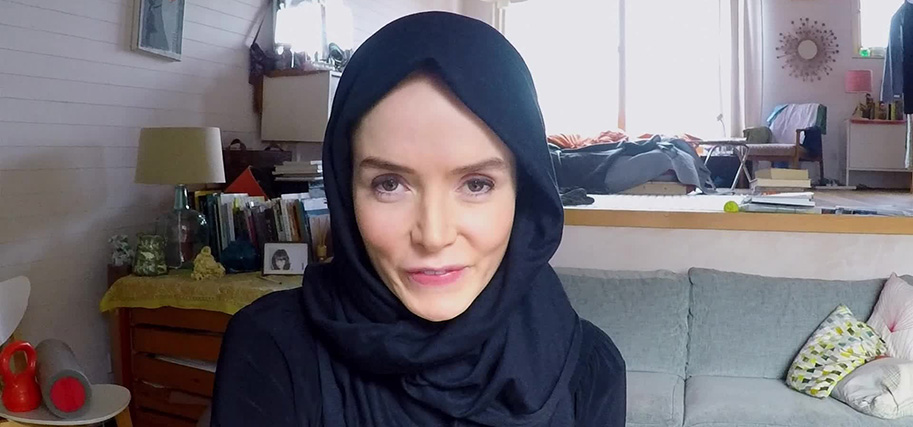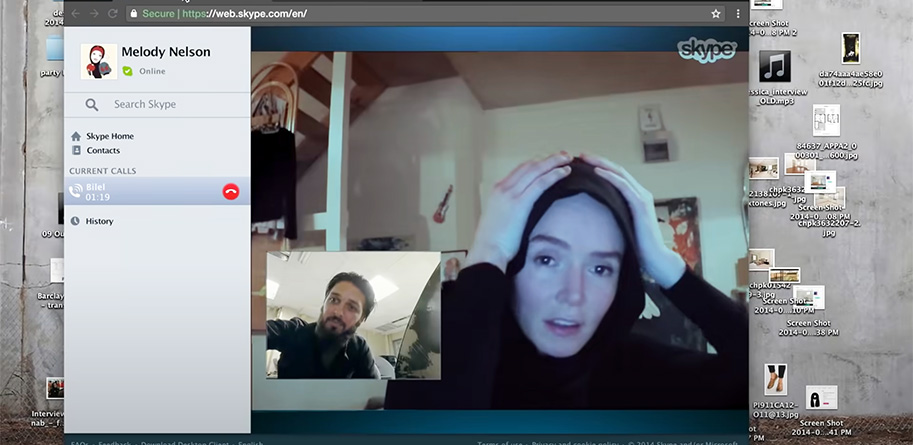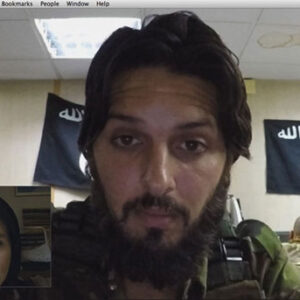Last Updated on August 5, 2021
PLOT: Trying to uncover how ISIS recruiters are able to lure young Westerners over to their cause, a journalist poses as a Muslim convert and tries getting close with a recruiter, making him believe she aims to travel to Syria to become his wife.
REVIEW: The true story of journalist Anna Erelle’s investigation into ISIS’ use of social media to recruit young people – particularly women – and manipulate them into abandoning their home and joining their cause in the Middle East, only to mistreat and abuse them, would make for a great tension-filled cinematic thriller. It could shine a light on the dark, all-too-accessible corners of social media, how dangerous of places they can be, and alluring extremist ideals can appeal to those who feel lost. Timur Bekmambetov’s Profile, which adapts Erelle’s book, “In the Skin of a Jihadist”, is not that movie. Everything about the subject matter that is complex, illuminating, and may even provide answers for the people who lost family members, is watered down to its most simplistic elements for the sake of rudimentary thrills, of which often fall flat on their own.
Known to mainstream audiences for his stylistic action movies like Wanted and Abraham Lincoln: Vampire Hunter, and maybe even for whatever 2016's Ben-Hur was, Bekmambetov finds himself operating in a completely opposite landscape, ditching the abundance of CGI for a desktop monitor. Taking inspiration from similar movies like Unfriended, Profile is designed to put you in the shoes of Amy (Valene Kane), as she gears up to investigate a member of ISIS (going under the name "Melody") in hopes of figuring out how they are able to get into the minds of young women and get them to leave everything behind and join their cause – only to end up being mistreated, sold off, or killed. As to be expected, there’s plenty of Amy jumping around on the web, bouncing between typing to her editor (Christine Adams), trying to get an advance to pay off her overdue rent, speaking with her boyfriend (Morgan Watkins) about moving into a new place, and all at a speed that reminded me just how unskilled I am at navigating a computer.

Originally hitting the festival circuit in 2018, the film was shot before the likes of Searching and The Host have come to represent the peak of the computer screen film but is only now getting released. Unfortunately, that means there’s nothing unique about the film's presentation to set it apart on a visual level, and perhaps only more to disorient. And yet, the movie’s high point comes as Amy pours over horrific videos posted on prominent ISIS Facebook pages – featuring them beheading or slitting the throats of hostages. Bekmambetov never dips too deep into the violence the group touts with praise but lets it linger just enough to instill a sense of danger. You may similarly feel like you’re investigating a disturbing, dark part of the web, which better helps you understand how dangerous a situation Amy is getting herself into. This is the movie at its most effective, ably putting you in the mindset of Amy as she finally contacts an ISIS recruiter and former British citizen, Bilal (Shazad Latif), and realizes there’s no going back.
Unfriended and The Host are all about the terror happening off-screen; Searching’s excellence is derived from the tension that came from the investigation a father's daughter’s life online. Here, the suspense and the stakes need to come from the conversations that happen between Amy and Bilal, and how they impact Amy offscreen. However, where this exploration falls incredibly flat is in how the conversations between Amy and Bilal feel incredibly thin, without much of any importance being discussed or emotional resonance genuinely occurring between them.
Bilal is handsome, with a dashing mop of black hair, and is what any Midwestern mom could even classify as “a real charmer.” One of the angles the movie aims to explore is how these scenarios may play out in the real world, and how these very charming men are so easily able to convince people to buy into their extremist points of view. But aside from talking about how much he hates his enemies and how casually he talks about killing them, so much of how he speaks to Amy amounts to no more than f**k boi speak, wherein he endlessly calls her “baby” and talks about beautiful she is, talking about how good he will treat her when they're finally married. His entire persona is that of a guy who is clearly juggling multiple women in his life – which while likely not far from the truth of the real story – makes up so much of his screen time despite there obviously being so much more to him that should give him a sort of cult-leader demeanor.

Trying to humanize him is necessary for the story so as to make it at least somewhat understandable that Amy feels herself growing closer to him – to the point where even she hesitates to give over some information to her editor, with Amy even getting very close to revealing herself as a journalist to Bilal after one fleeting, heartfelt exchange. But other than rushed moments where he talks about the racism he experienced living in Britain and how his mother died, there’s very little that justifies Amy’s struggles with maintaining her cover. Their dynamic simply comes off as that of virtual pen pals (with inklings of something more romantic), when truly something more complex happening on an emotional, psychological level, especially on Amy's end.
As for Amy, both the script from Bekmambetov, Britt Poulton and Olga Kharina – coupled with Bekmambetov’s direction – find her juggling so much that I never felt like I was getting a great sense of what she really thinks about Bilal or his views. There are the smallest of hints into how her growing closer to Bilal is impacting her, but not nearly on the level to make for the compelling tension behind the notion of “Is she herself being manipulated?” Between dealing with her editor, her boyfriend who notices her time is too dedicated to her subject, and talking with Bilal, it’s far too easy to lose grip on her as a character, as well as find her overall mission of figuring out how young women are being manipulated by these men feel woefully underexamined. That also doesn’t leave Kane room to do much with the character other than to showcase some exacerbated looks, trying to lend some emotion to her screen time when the rushed plotting leaves her character’s development lacking.
Admittedly, I found myself eager to make it to the end of the movie for what was expectedly set up for some kind of twist, but most of that was based on how obviously shady Bilal is, and me wanting to see just how evil his intentions were. By the end, the point is driven home how dangerous the internet can be and cautious people need to be when talking with people who you think are on your side. Still, I can’t help but feel that was the easiest theme of the movie to drive home, and come the end, the final stretch feels so convoluted and ludicrously plotted, mostly because none of the earlier groundwork properly sets the stage.
Amy sacrificed her safety in the name of good journalism, and the work of the real-life Anne shouldn't be diminished simply because this movie version of her actions doesn’t properly do her work justice. The mistake, among more than a few, lies in the decision to use the computer screen style itself, which is inherently too minimalist to tackle such weighty, complex character dynamics – which done right – could’ve illuminated so much more of what the movie hints at, but rarely manages to explore. With a presentation that’s forced to rely on the bond of two people – and the consequences and dangers of that bond – Profile fails to live up to the material’s potential with thin character development stretched over far too many open desktop windows.

































Follow the JOBLO MOVIE NETWORK
Follow us on YOUTUBE
Follow ARROW IN THE HEAD
Follow AITH on YOUTUBE